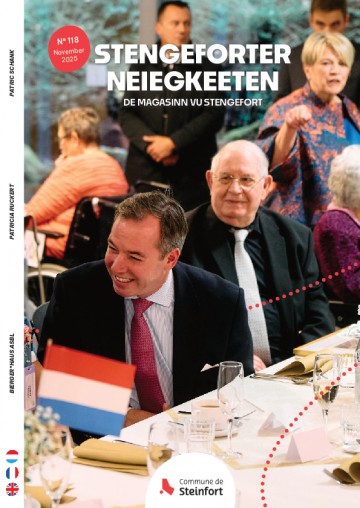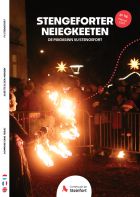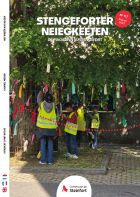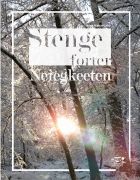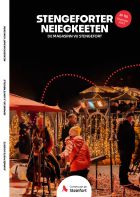Stengeforter Neiegkeeten N°118 - Novembre 2025
Nombre de téléchargement: 276
Portrait of Patric Schank
LSAP Representative on the Steinfort Municipal Council
Patric Schank has demonstrated a strong sense of social justice and commitment to community issues since his youth. He is dedicated to helping those often overlooked, particularly young people and vulnerable groups. He has also left a lasting mark on local club life, notably as the long-standing president of FC Stengefort.
A retired CFL employee and one of the last to serve at Kleinbettingen station, Patric is a father of three and resident of Hagen. He combines civic engagement with a deep sense of human connection, expressed through recreational activities, personal contacts and political work.
Since being elected to the Steinfort municipal council in 2023, he has continued to place people at the heart of his political efforts. His key priorities include social inclusion and supporting senior citizens, the latter through his role as president of Amiperas. He also advocates for improved access to specialised healthcare services through closer cooperation between the CHL and HIS.
An active member of various advisory committees, including Family & Seniors and Social Affairs & Equality, Patric Schank is committed to local engagement with one overarching goal: to strengthen the well-being and integration of all residents of the municipality.
Read on to learn more about Patric's background, political values and vision for the future of our municipality.
Describe yourself in a few words
I'm 70 years old and 177 cm tall (a few centimetres less than 20 years ago). Unfortunately, the opposite is true for my weight, as I've gained a few kilos, which can be annoying when doing sports or buying clothes. Jokes aside, despite these “anatomical peculiarities”, I am a sensitive person whose awareness of social injustice and discrimination has always motivated me to fight for equal opportunities.
What motivated you to become involved in politics?
I have always been a committed person, whether in sport or cultural associations. But it was only after becoming a father around 30 years ago that I entered politics. For me, being a parent means ensuring children can grow up in a fair society and a healthy environment. This cannot be achieved by just chatting at the bar. In a democracy, you need to express your views in the proper forums and that means getting involved in politics.
You have been president of FC Stengefort for many years. Which memories stand out to you?
There were many wonderful moments, as well as some less pleasant and stressful ones. However, just like the players on the pitch, we were a passionate committee, with everyone contributing their skills to the best of their ability. Our youth commission also did an outstanding work, organising training sessions and matches for our young players. The highlight was our promotion to the Fortis Ligue (now the BGL Ligue) in 2008 after a relegation match against Wiltz. Notably, many players from Steinfort were in the first-team squad during this “adventure”, something rare in today’s clubs. Unfortunately, with limited finances and an insufficiently strong squad, we could not compete at that level and were relegated after one season. That same year, the committee unanimously decided to affiliate with Sporting Clube de Portugal, a renowned club based in Lisbon. We expected that this would bring more Portuguese fans to the pitch and integrate them into village life. However, most Portuguese football fans in Steinfort support Benfica Lisbon, so this idea never really took off. As the saying goes: hindsight is 20/20!
I have many fond memories of 2013, when we celebrated 100 years of organised football in Steinfort with sporting and cultural events such as an academic session to a gourmet hike, tournaments and the publication of a book on local football history.
In your opinion, what are the greatest social challenges our municipality faces?
Like the rest of the country, Steinfort's biggest challenge is housing, which creates social tensions and inequalities. A key responsibility for the municipality is to create as much affordable housing as possible, within the limits of financial, legal, and urban planning frameworks. We must also strengthen support for assisted living so that our senior citizens, as well as younger generations, can continue living in the municipality. Sadly, our options are limited, as the municipality itself has little land available for construction.
Your slogan for the 2023 municipal elections was “Together for our senior citizens”. How is this reflected in your work and initiatives?
Growing old is often associated with loneliness and health challenges. We must therefore offer opportunities for social contact so our seniors remain active and connected. In addition, we must guarantee them the best possible medical care and ensure it is easily accessible. The Bierger*Haus, Proxibus and the expansion of medical services in our hospital are three initiatives that help us to improve the quality of life for senior citizens.
You are advocating closer cooperation between the CHL and the HIS. What specific benefits would this bring to residents?
In many cases, the exhausting trip to and stay at the CHL would no longer be necessary. This would be a huge relief and reduce stress for patients, particularly elderly citizens who require frequent care.
What aspects of your work for young people and disadvantaged individuals matter most to you?
These two groups are among the most vulnerable in our society. Young people often struggle to gain a foothold economically or professionally, while disadvantaged individuals have never been fully included in our consumer society. It is crucial to give young people clear pathways, through education, apprenticeships, or degrees, that enable them to build fulfilling careers. And in one of the richest countries in the world, it is unacceptable that people cannot afford a roof over their heads. The public sector (state and local authorities) must do more to ensure housing construction is priced fairly and equitably.
If you could make one immediate change in our municipality, what would it be and why?
I would move the football pitch to make space for a well-located residential area. I would also tackle the traffic jam at the Kleinbettingen barrier, expand the station car park, and build a bypass around Steinfort to divert rush-hour traffic from Belgium and the east.
Patric Schank - Up Close and Personal
Fork and knife or wooden spoon and kitchen knife
If you have a fork and knife in your hand, it means you are going to eat. If you have a kitchen knife and wooden spoon in your hand, it means you are helping to cook. So it's the first option!
Book or cinema
Book, you don't have to leave the house for that.
Cat or dog
Dog; it is more sociable and you go out for walks even in the rain.
Mirador or Steinfort Pond
Steinfort Pond … a different atmosphere every day
Football pitch or Bierger*Haus
With age, more and more Bierger*Haus
Mobile phone or landline
Mobile phone, so you are never alone.
Tea or coffee
Coffee, out of habit
Trip in a vintage car or cruise on the Moselle
Cruise on the Moselle because you are shaken around less.
Be cosy at home or tutoring lessons for curious children
Both work well together.
Head/mind or heart
Both together work best.
*****
STENGEFORTER PERSÉINLECHKEET: Patricia Ruckert
Between Pots and People: A Life Story from the Municipality of Steinfort
Born in Steinfort and raised in Clemency, Patricia Ruckert now lives in Kleinbettingen with her husband, André Hemmen. For many years, her life revolved around Steinfort. To many within the municipality, Patricia's name is inseparably linked to the Hôpital Intercommunal Steinfort (HIS). She devoted 38 years to the hospital kitchen, working with remarkable passion, humanity, and assurance. Recently, she co-published a cookbook highlighting the HIS kitchen team - a portrait in recipes that reflects dedication, creativity and a strong sense of community.
Patricia moved to Steinfort with her husband and immediately felt at home. “For me, it was almost like coming home,” she recalls. Her daughter was born here and continues to live in the very house in where the family first settled. Coming from a family of seven children, she assumed many responsibilities from an early age, including working in the kitchen, where she discovered her love for cooking.
How the kitchen became the heart of daily life
She began her career at HIS as a kitchen assistant, gradually worked her way up to head chef. This role enabled her not only to cook but also to mentor young people and develop the kitchen team. “I have always been drawn to the opportunity to work with my team and teach them skills that will serve them in the future,” she says.
Heart and structure at HIS
During her tenure at HIS, Patricia and her team introduced numerous innovations, including establishment of a restaurant, which allowed family visits to take place in a more intimate setting. This initiative also enabled kitchen staff to engage more directly and personally with residents – an aspect Patricia consistently emphasised as vital.
The kitchen underwent significant structural modernisation during her leadership. As head chef, she assumed additional responsibilities, liaising with management and ensuring that quality and safety standards were maintained. A warm, empathetic atmosphere was central to her approach, always striving to incorporate residents’ suggestions into menu planning, even when immediate implementation was not feasible. In some cases, the Amicale provided creative solutions. For example, when a resident requested fresh horse steak - which could not be prepared in the hospital kitchen due to workflow constraints – the Amicale organised a trip to a restaurant for a group of residents.
Recipes with character and a story
The idea for the cookbook, entitled Eis Kichen – Un livre de cuisine confectionné avec passion (Our cuisine – A cookbook crafted with passion), originated with the hospital management. Initially, the plan was to share recipes via Facebook, but it soon evolved into a full book. Chefs were invited to contribute their own recipes, each credited to its creator. Patricia herself shared two of her favourite dishes: spaghetti with courgette and scampi, and traditional Boxemännchen for St Nicholas Day. Published by HIS, the book is available for purchase directly from the hospital, with a major launch event planned for autumn, including a session at Ernster bookstore.
When culinary enjoyment and community go hand in hand
For Patricia, enjoyment is the key to success in the kitchen – a belief that has guided her throughout her career. To her, food is not just nutrition; it is a social connector to bring people together, creates memories, and strengthens the community. “Many people associate a dish with a person or a moment. And that's beautiful.”
New chapters in the same book
Although Patricia retired in January this year, she has no intention of slowing down. She has been involved with the Amicale for over 20 years and plans to continue contributing to the municipality. Her home remains a gathering place for friends and family, with the kitchen still at its heart.
With her calm manner, empathy, and immense professional pride, Patricia Ruckert has shaped not only the HIS kitchen but also life in the municipality. She is a Stengeforter Perséinlechkeet who exemplifies the value that good food and good people bring to a community.
*****
Stengeforter Veräiner - Bierger*haus asbl
La Bierger*haus asbl au service de nos résident·e·s
Dans cette édition des Stengeforter Neiegkeeten, nous avons le plaisir de vous présenter une jeune association de notre commune, la Bierger*haus asbl. Depuis 2024, l’association anime le tiers-lieu « Bierger*Haus » situé rue de Luxembourg à Steinfort, un espace citoyen inclusif, ouvert à tou·te·s les résident·e·s et personnes travaillant dans la commune, sans distinction d’âge, de genre ou d’origine. Ce lieu, officiellement inauguré lors de la Journée de l’Europe en 2024, encourage les gens à se réunir, à échanger des idées et à participer à la vie civique grâce à un programme bien pensé d'activités diverses : ateliers créatifs, rencontres intergénérationnelles, soirées littéraires, afterworks, etc. Les habitant·e·s sont invité·e·s à proposer leurs idées afin que le Bierger*Haus devienne un véritable laboratoire d’initiatives locales, géré en partenariat étroit avec la commune et respectant les valeurs d’égalité, d’inclusion et de vivre-ensemble.
Pour en savoir plus sur leur mission et leurs activités, nous avons posé quelques questions aux membres fondateurs de l'asbl Bierger*haus. Voici leurs réponses.
En quoi le Bierger*Haus se distingue-t-il d’autres espaces associatifs ou culturels de la commune ?
La principale différence réside dans le fait que le Bierger*Haus est une maison citoyenne gérée par et pour les citoyen·ne·s, dont l'objectif principal est de permettre à nos concitoyen·ne·s de déterminer eux-mêmes le programme du Bierger*Haus en apportant leurs idées et leurs projets. Cela fait d'eux des acteur.rice.s de ce qui est proposé, plutôt que de simples consommateur·rice·s. De plus, tout le monde peut participer aux activités, qu'il/elle soit membre ou non.
Quelles sont les valeurs fondamentales qui guident vos actions et votre programmation ?
Ce qui nous tient à cœur, c'est de proposer un espace où tout le monde est le/la bienvenu·e et peut se sentir chez soi, où les idées de chacun·e sont les bienvenues. Le programme est conçu pour permettre à nos concitoyen·ne·s de se rencontrer, de faire de nouvelles connaissances et ainsi de promouvoir le vivre-ensemble dans notre commune, indépendamment de l'âge, des origines, du sexe, etc.
Comment l'association est-elle gérée ? Comment peut-on devenir membre ?
La création de l’ASBL est le résultat d’un processus de participation citoyenne, qui avait initialement été piloté par la commune et lors duquel des personnes intéressées ont participé à des groupes de travail. Finalement, l'ASBL a été fondée pour gérer le Bierger*Haus et aider nos concitoyen·ne·s à concrétiser leurs idées. Notre comité est actuellement composé de six personnes qui assument ces missions : nous travaillons avec les citoyen·ne·s pour définir le programme mensuel, nous nous occupons des réservations, des flyers et de la communication sur les réseaux sociaux, et nous assurons également la liaison avec la commune. Ainsi, les habitant·e· n'ont qu'à se soucier de l’animation de leurs activités.
Tout le monde peut devenir membre en remplissant simplement un formulaire d'adhésion. Cependant, il n'est pas nécessaire d'être membre pour participer aux activités ou proposer une nouvelle activité ou un nouveau projet.
Nous profitions de cet entretien pour lancer un appel à toute personne intéressée – qu’elle ait déjà participé aux groupes de travail de la commune ou qu’elle ait envie de participer maintenant : n’hésitez pas à nous contacter afin de remplir le Bierger*Haus de vie avec nous.
Quels sont les critères pour proposer ou organiser une activité au Bierger*Haus ?
Les activités proposées au Bierger*Haus doivent être accessibles à toutes et à tous, il ne s'agit donc pas d'événements privés. Elles devraient être gratuites dans la mesure du possible et favoriser les échanges et les rencontres. Bien sûr, nous veillons toujours à ce que l'activité soit adaptée à l'espace et qu'elle complète l'offre déjà proposée par d'autres associations et la commune.
Pouvez-vous nous donner un aperçu des activités qui ont eu lieu depuis l'ouverture ? Quelles sont les principales activités ou les commentaires notables des participants ?
Depuis notre lancement en janvier, 10 activités différentes ont déjà été organisées. On peut distinguer les activités menées par l'ASBL et celles menées par les citoyen·ne·s ou d'autres associations.
En tant qu'ASBL, nous proposons actuellement des activités issues du processus de participation citoyenne : la rencontre des (grands-)parents avec des enfants âgés de 0 à 3 ans et l'après-midi jeux de société. En octobre, nous avons également organisé un atelier afin de recueillir de nouvelles idées pour le Bierger*Haus et ainsi façonner le futur programme
Ensuite, bien sûr, nous proposons toute une gamme d'activités offertes par les citoyen·ne·s :
Une fois par mois, Paul, Malou, Aicha et Diane organisent une soirée littéraire où toute personne intéressée peut présenter un livre qu'il/elle a particulièrement apprécié ou venir chercher l'inspiration.
Joëlle propose une initiation à la peinture aquarelle. Cette activité a rencontré un tel succès que Joëlle partage son talent deux fois par mois depuis octobre. D'ailleurs, l'image utilisée sur le flyer est une aquarelle peinte par elle-même.
Johanna et Corinne proposent un après-midi ouvert où les citoyen·ne·s peuvent se rencontrer sans avoir à participer à une activité spécifique. Elles proposent également un après-midi tricot et crochet où les gens peuvent se retrouver pour tricoter et crocheter, discuter et apprendre les un·e·s des autres.
En décembre, Luc organisera une dégustation de crémant avec des vignerons luxembourgeois.
Nous organisons également une rencontre mensuelle pour les seniors, organisée par l'AMIPERAS, mais ouverte à toutes et à tous. En septembre, l’Office social a organisé un goûter au Bierger*Haus à l’occasion de la rentrée scolaire.
Nous essayons de proposer un mélange équilibré d'activités spécifiques et de moments plus détendus lorsque le Bierger*Haus est ouvert et que vous pouvez simplement passer nous voir.
Comment garantissez-vous l’inclusion et la diversité dans vos activités et la participation ?
Comme mentionné précédemment, tout le monde est le/la bienvenu au Bierger*Haus. Afin d'attirer un public plus diversifié, nos flyers et nos communications sont bilingues, et nous veillons à ce que les langues parlées pendant l'activité soient toujours indiquées sur les flyers. Nous travaillons avec différents partenaires, tels que l’Office social et AMIPERAS, afin de diversifier notre public. Nous aimerions développer davantage cet aspect à l'avenir.
Quelle influence souhaitez-vous avoir sur la vie locale et communautaire à Steinfort ?
Nous voulons être une maison des citoyen·ne·s pour les citoyen·ne·s : un lieu où les gens peuvent se rencontrer, quels que soient leur âge, leur origine, etc. Nous voulons créer un lieu où les gens peuvent venir lorsqu'ils/elles ont besoin de changer d'air ou ne veulent pas être seul·e·s, et où ils/elles se sentent aussi à l'aise que chez eux.
Nous voulons être un lieu où les gens peuvent venir avec leurs idées, où les talents peuvent être mis en valeur et où nos concitoyen·ne·s peuvent partager leurs passions. Nous voulons être un espace où les gens sont valorisés et peuvent réaliser leur plein potentiel.
